Turkey’s Unrest: A Fight for Secularism
It is often agonizing for Americans who recognize their government as being the greatest threat to peace and freedom in world history to see how ignorant most of their fellow citizens are to what is obvious to the rest of the world; however, recent events are opening the eyes of citizens in the United States and around the world to an internationalist perspective. We must use the massive democratic protests in Turkey to help enlighten westerners who tend to accept far too much of what they are told by the corporate media.
The protests in Turkey are too large to ignore. With varying degrees of accuracy, mainstream media are carrying the story. Its inane commentators cannot hide the fact that the demonstrators are demanding democracy in a nation that the US government has held up as a model of a secular Islamic society. This should raise questions for any American who gives the news a moment’s thought. If Turkey is a democracy, what is the fuss all about? If it is not, then why is it being praised by the US government as the West’s great ally in the struggle against Bashar al-Assad of Syria? A basic understanding of Turkish political history will help to understand the situation in Turkey today and its implications for the coming world order.
Turkish independence in 1923 was a triumph of secularism after a hard-fought victory for national self determination. After the fall of the Ottoman Empire at the end of WWI, the Allies occupied what is now Turkey with the intent of dividing it among them, as the rest of the fallen empire was torn apart. Turkish nationalists, led by Mustafa Kemal (later known as Ataturk, or Father of the Turks), organized resistance and headed the new government formed after the British occupiers dissolved the last Parliament under the Ottomans. The new Grand National Assembly raised a military force sufficient to compel the withdrawal of the British and defeat Greek, Armenian and Italian forces that attempted to seize parts of the Anatolia region by force.
The nation that Ataturk shaped was very different than the Empire that preceded it. Under his leadership, a modern state was forged on the principle of equality between members of all ethnic and religious groups. Imperialist expansion based on ethnic links of the Turkic people was explicitly discouraged, reflecting lessons learned from the long history of the rise, corruption and fall of the Ottoman Empire. A government was formed that espoused the ideals of a government of, by and for the People and made many reforms that moved the country toward that ideal, from free compulsory education to women’s suffrage.
One of the more controversial reforms was separation of religion and state. It was not until 1937 that the constitution was changed to strike the article stating that Islam was the “established religion” of Turkey, although public education had been secular since its inception. More controversial still was the banning of head scarves for women in public, which gave credence to accusations that Turkish secularism was in fact anti-Muslim, though the stated intent was to oppose Islamism, or the re-establishment of an Islamic government where religious authorities controlled political affairs. The tension between Islamists and the government were never completely resolved and is central to understanding the current turmoil in Turkey.
Prime Minister Recep Tayyip Erdogan is the head of the Justice and Development Party (AKP in Turkish), which was founded by Islamists. Despite protestations to the contrary, it has a clear agenda to reverse the long history of secularism in Turkey. As in the US, this unspoken agenda appears to be one of the bases for the popularity of the conservative agenda and is a major factor in the deep divisions between the left and right. Erdogan was banned from holding office for years for his promotion of Islamism, but growing support for the idea has led to increasing support for him and the AKP since 2002, when the party first won a majority in Parliament. Even as his popularity grew, millions marched in protest in 2007 when he was announced as a possible presidential candidate. Although the party again swept to victory in the elections that year, in 2008, the party and 71 of its leaders were nearly banned for promoting Islamism. Party leaders now refer to the episode as a “failed coup.”
Religion is not the only issue that divides Turkish citizens. The AKP was deeply divided in 2003 when the government proposed giving permission to the US to use Turkey as a staging ground for the illegal occupation of Iraq. The party survived this and Abdullah Gul, the Prime Minister then, now serves as President. The AKP continues to be very pro-western and is a key supporter of the attempted NATO coup in Syria, further inflaming emotions among secular nationalists in Turkey and especially the youth, who recognize that Erdogan’s goal is the establishment of an Islamist government in Turkey and that the fall of Syria’s secular government with his support would be a major step in that direction.
The anniversary of Turkish independence on October 29, 2012 was a turning point in Turkish history. Erdogan imperiously banned a major rally in Istanbul, claiming that “subversives” were planning on using the event to undermine national security. Leaders of opposition parties on the left rallied with thousands of supporters in defiance of the dictate, and many of them protested the recent vote of Parliament that authorized troops in neighboring Syria. This act was analogous to the US Senate’s Authorization of Force that gave Bush, and now Obama, carte blanche to conduct wars for corporate empire in the guise of fighting terror. At the same time, the Turkish military was already bombarding Syrian troops across the border they were trying to secure after it was destabilized by Turkish-protected and NATO-supported terrorists of the FSA. Needless to say, this aspect of the protests was ignored by the western media.
Fast forward to the present, with hundreds of thousands of mostly young Turks around the country protesting for weeks, for reasons that are unclear only to readers of the western corporate media. The protests were touched off by the news that the government variously planned to erect a replica of Ottoman-era military barracks, a shopping mall and mosque in Taksim Square, where Istanbul’s last green space is located in Gezi Park. Because mall construction would destroy the green space, the protesters were described as “environmentalists” long after this issue was eclipsed by more fundamental issues regarding the relationship of the government to society. Young Turks see the fundamental character of the nation as being threatened by growth of the Islamist movement. These concerns are derided by the government and some western media as a desire to preserve the right to drink alcohol, but of course the real issues are more significant.
Taksim Square is an iconic location for Turks, the scene of major protests in past decades and national celebrations in better times. Originally the site of operating military barracks during the Ottoman era, their reconstruction as a museum is taken by some as, at best, as being incongruous with their history as a symbol of democracy and, at worst, as being a step toward refurbishing the reputation of the former Islamist government. Building a mosque nearby is seen by some as further evidence that the idea is driven by Islamist ideology rather than national pride. One must wonder if a proposal to turn the last green space in Istanbul into a shopping mall does not offend the sensibilities of conservative Turks who are disgusted by western materialism as much as it does environmentalists who want to preserve the trees in Gezi Park.
Turkey is at a crossroads. Like the US, it was created by patriots willing to die for freedom. Similarly, prosperity eventually followed but with progress came a backlash against paying the price of modernity that comes with individual freedom. Currently freedom and prosperity are threatened in both nations and in the world by powerful global elites who find it advantageous to promote Islamism over secularism and democracy around the Mideast. The consequences for Turkey are more immediate.
Those who back Erdogan’s bid to create an Islamist government in Turkey are the same corporate elites behind the coup in Libya and attempted coup in Syria. They have armed and set loose fundamentalists who promote Islamism by fighting against secular governments that have dared to challenge those of the Empire being constructed by the US, NATO, Israel and the Gulf monarchies. The interests of these governments are defined as being synonymous with the international corporate terrorists who control them. Erdogan and the DPK are key conspirators in the effort to destabilize the Mideast in preparation for a New World Order in which, if successfully implemented, no one will be free.
Turks must continue to stand up for the democratic principles on which the nation was founded, despite the government’s violence and oppression. Should the people let Erdogan and the AKP get their way, Turkish self-determination might become collateral damage in the War on Terror that serves as a smokescreen for global domination. Once Erdogan and the Turkish military have served their purpose for the Empire, there is no reason to expect it to show loyalty to the nation, let alone its people. Should Turks prove resistant to becoming complicit in the murder of tens of thousands of their Syrian neighbors, the corporatocracy might back the government or promote violent resistance to it, knowing full well the chaos this would create. As events in Libya and Syria show, the global elite behind the Obama doctrine of using terrorists to fight proxy wars do not fear the consequences of destabilizing the region.
Turkish protestors have already spoken up in support of besieged Syrians. They clearly recognize that their cause is the same. Citizens of the US and other NATO governments likewise have a duty to support Turks, Syrians, Libyans and the peoples of all nations threatened by a corporate Empire that is poised to control the planet. Their governments too have been hijacked by the global elite, and their only hope for freedom is to build a united international front against fascism and war.
At a rally in New York recently, Turks and Greeks stood side by side behind a banner that read “We are all Greeks now”: a symbol of unity with the Greeks’ struggle against the economic depredations of the global elite, who are in the end part of the same corporate Empire bent on military domination of the Mideast. As Turks stand against the Empire’s attempts to divide them and their nation against Syria, I would add: we are all Turks too.
Editor’s Notes: Rick Staggenborg, MD is a former Army and VA psychiatrist who ran for the US Senate in 2010 on a campaign based on a pledge to introduce a constitutional amendment to abolish corporate personhood. All photographs by Active Stills.
Related Articles

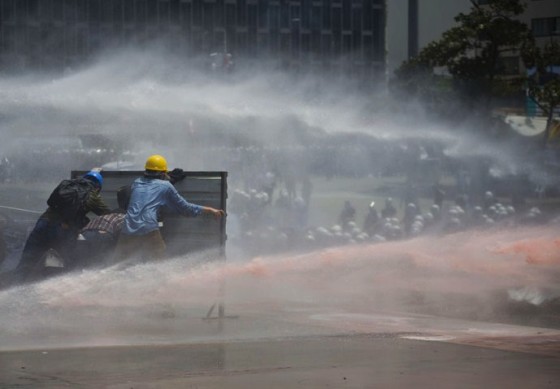
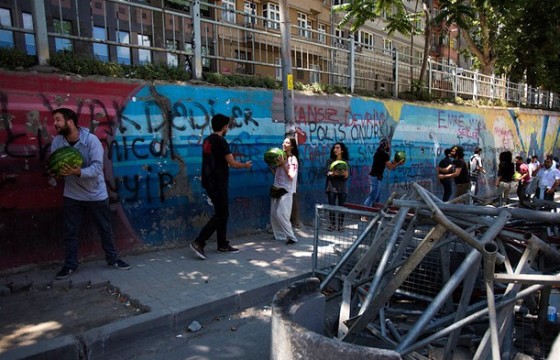
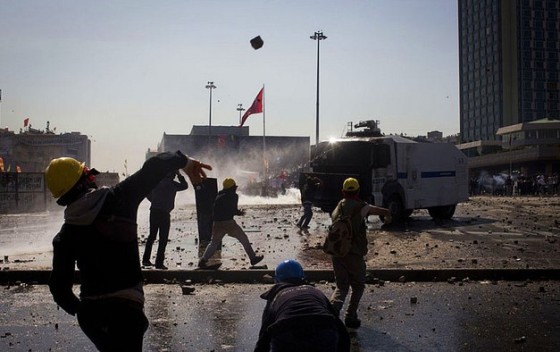
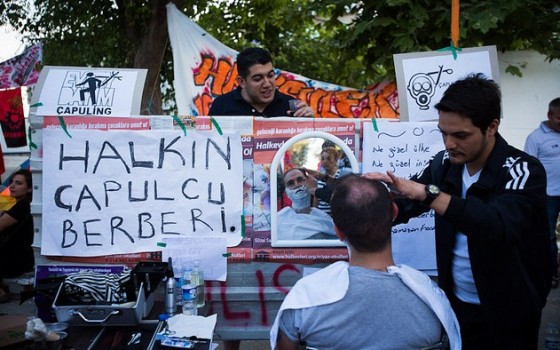
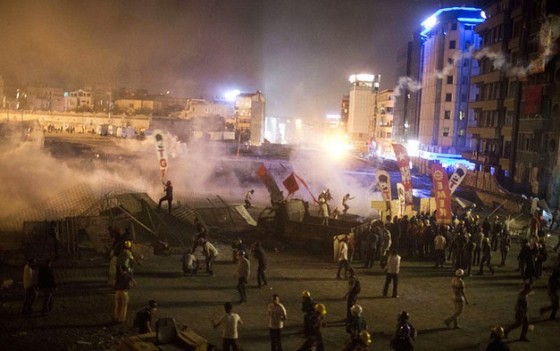
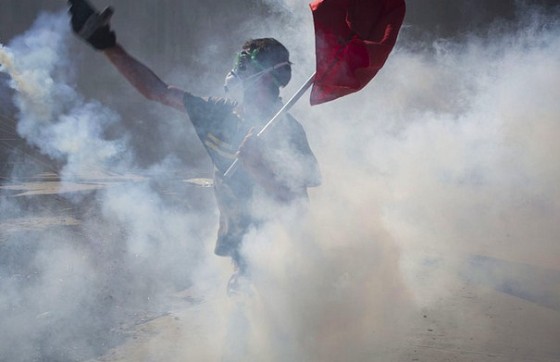











You must be logged in to post a comment Login